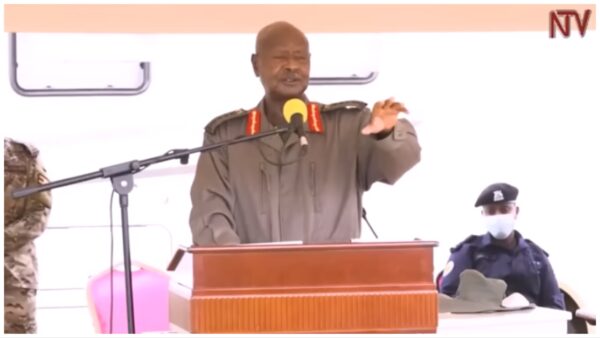Ugandan President Yoweri Museveni apologized for the roles that previous chiefs and leaders in the nation-state of Uganda played in selling people of African descent into slavery during the colonial age.
Multiple YouTube channels posted the remarks online over the weekend.

“We come in the humility and brokenness to repent for the sins of the leaders in Africa and in particular, the sin of selling our own brothers and sisters into slavery,” Museveni said. “This great sin brought untold pain and misery to millions of people of African descent and judgment to the African people who remain on the continent.”
He went on to talk about how the continent’s leaders at the time were complicit in slavery, and he expressed remorse to descendants of enslaved Africans.
“If it were not for the part that our African kings and chiefs played in the slave trade, this evil trade could not have survived. Today, we ask for forgiveness,” Museveni pleaded. “We seek forgiveness for the great pain and loss that the myopic and selfish decisions of our leaders caused our brothers and sisters of African descent around the world and we ask their forgiveness.”
In 1998, during a visit to Uganda from former U.S. President Bill Clinton, Museveni commented about chiefs involved in the trade, calling them “Black traitors,” which diverted blame at the time from Western leaders. He said that because African chiefs waged war on each other and captured their own people to sell them, they should be the ones to apologize. “We still have those traitors here even today,” Museveni said at the time.
He finished his speech by requesting that people of African descent from all over the world return to the continent as a means of reconciliation.
“Today, we reopen the door to our brothers and sisters of African descent to return home to the continent of Africa, the land of their ancestry, and the spiritual homeland of all African people. We welcome you home with open arms as brothers and sisters and pray that we can close the door to the dark past and walk toward a better future.”
Museveni has been in power for more than 37 years. He was first elected in 1986.
Museveni isn’t the only African leader or representative to make an apology for slavery. Last September, a group of delegates from the nations of Gambia, Zambia and Ghana also gathered to offer a formal apology for their nations’ roles in slavery. In 1999, the president of Benin also apologized, and in 2006, Ghana apologized to American descendants of enslaved Africans.
Calls as far back as 2009 from the Civil Rights Congress of Nigeria have been made to local and tribal chieftains to acknowledge their ancestors’ parts for raiding villages and kidnapping defenseless people to trade them to Europeans.
In 2014, a Cameroonian chieftain apologized to an African-American who traced his ancestry to a couple of local clans. Other West African tribal leaders also have made similar concessions.


